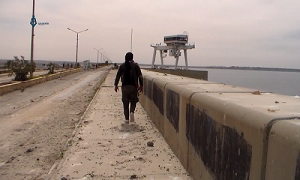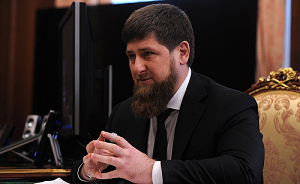Central Asian Militants’ Shifting Loyalties in Syria: The Case of The Turkistan Islamic Party
By Jacob Zenn
April 19, 2017, the CACI Analyst
Since the August 30, 2016 car bombing in front of the Chinese embassy in Bishkek, Kyrgyzstan, concerns have increased about Central Asians carrying out attacks in their homelands after they leave the war in Syria. A growing number of Central Asians in Syria, especially in the Turkistan Islamic Party (TIP), are becoming dissatisfied with al-Qaeda because it is limiting external operations, while the terrorist organization known as the Islamic State in Iraq and Syria (ISIS) is actively promoting attacks abroad. Moreover, a number of TIP fighters disagree with the Syrian al-Qaeda affiliate's re-branding to appear "less al-Qaeda-like" and "more Syrian." ISIS is eager to see defected TIP members in its ranks, which could enable these fighters to target Central Asian or Chinese interests abroad in the name of ISIS.

Attacks in Chechnya Suggest Opposition to Kadyrov is Far from Eradicated
By Emil Souleimanov
March 24, 2017, the CACI Analyst
At the turn of 2016 and 2017, events took place in parts of Chechnya that again challenged the triumphant statements of local pro-Moscow and federal authorities that the jihadist-inspired insurgency in this North Caucasian republic was eradicated. Aside from illustrating the latent character of armed conflict in the region in general and in Chechnya in particular, the recent upsurge of violence in Chechnya contains particularities that may have far-reaching consequences. Sporadic attacks against the Kadyrov regime will likely recur in the years to come and intensify should the regime’s grip on power weaken. 
Iran's empowerment in Central Asia and the South Caucasus
By Richard Weitz
October 19th, 2015, The CACI Analyst
Although international attention regarding Iran naturally gravitates towards Tehran’s activities in the Persian Gulf and the nuclear realm, Iran is also an active player in the South Caucasus, Central Asia, and Afghanistan. Thanks to its nuclear deal with the great powers, the subsequent relaxation of sanctions, and the growth of regional terrorism and Russian military activism, Iran’s influence in the region is set to grow considerably in coming years, though not necessarily to the benefit of the regional states or their Western partners.
The fall of Kunduz and Taliban resurgence
By Sudha Ramachandran
October 15th, 2015, The CACI Analyst
The fall of Kunduz to the Taliban has set alarm bells ringing not only in Afghanistan but also far beyond its borders. The capture of Kunduz, even if only temporary, has far reaching implications. It has dealt the Afghan government a heavy blow and is a huge setback for President Ashraf Ghani’s approach and strategy towards the Taliban. While it is expected to force the U.S. to revise its plans for troop withdrawal, Russia, China and Central Asian governments are watching the Taliban’s northward expansion nervously.
Russia's Syria initiative and the exaggerated ISIS threat to Central Asia
By Emil Aslan Souleimanov
September 25th, 2015, The CACI Analyst
Russia’s recent military engagement in Syria and calls for the establishment of an international coalition against the terrorist group calling itself the Islamic State (ISIS) has produced renewed interest in Moscow’s policies toward the jihadist quasi-state. Against this background, while many have speculated about Moscow’s true intentions in the Middle East, relatively little attention has been paid to Moscow’s interests in Central Asia and the Caucasus in the context of its increasingly vocal rhetoric of fighting ISIS. Moscow is actively utilizing the risks and threats stemming from the ISIS to boost its clout in the near and far abroad.






